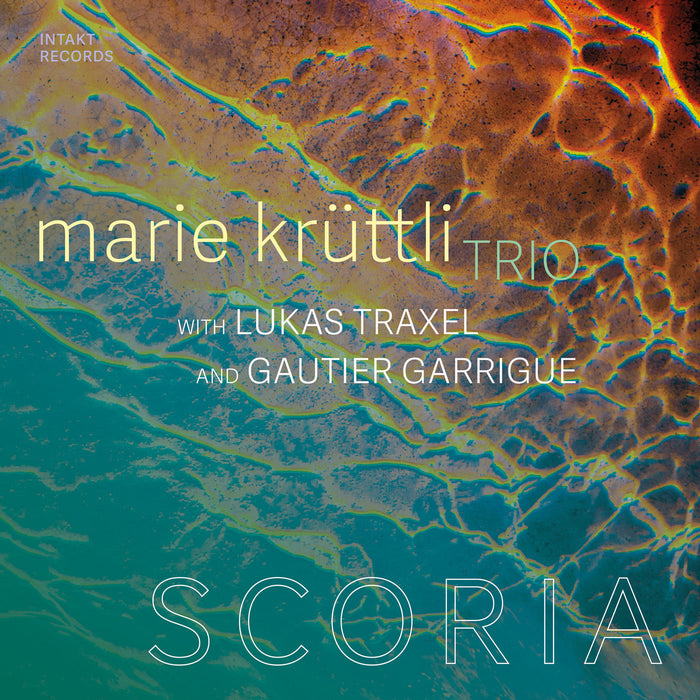
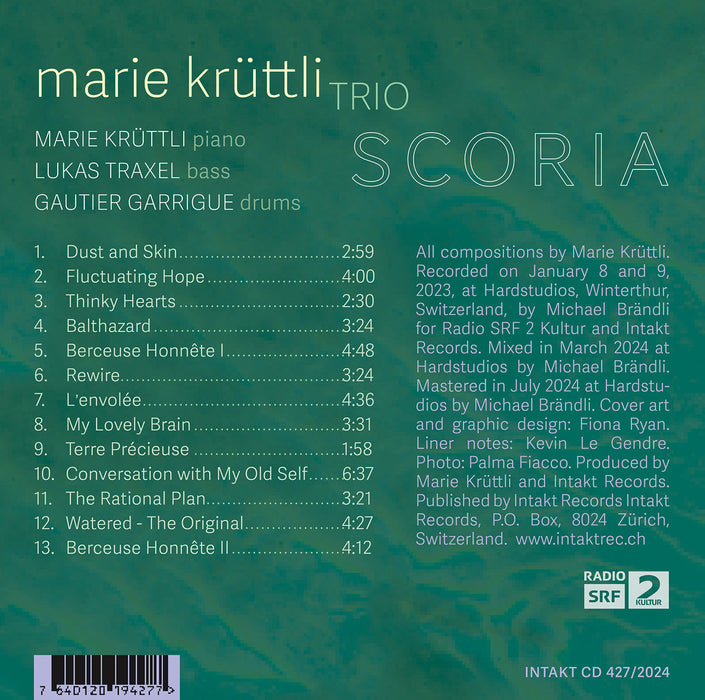
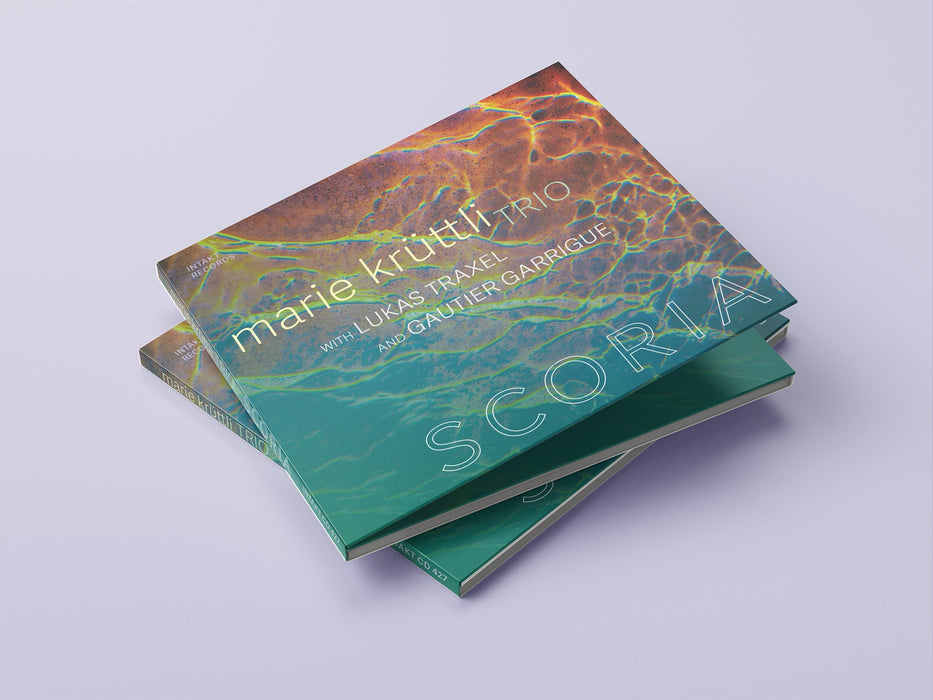
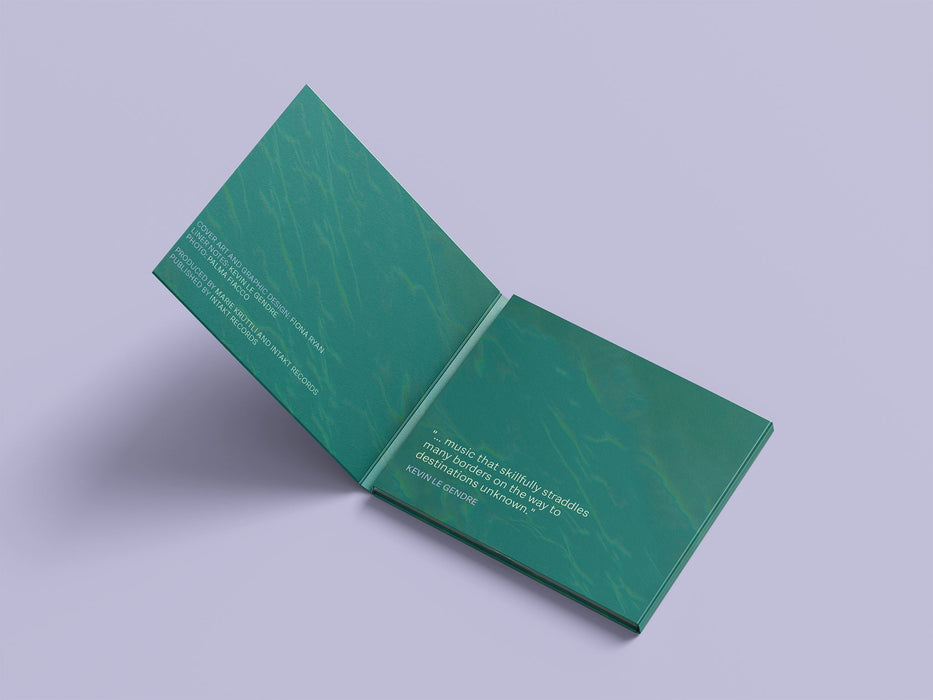
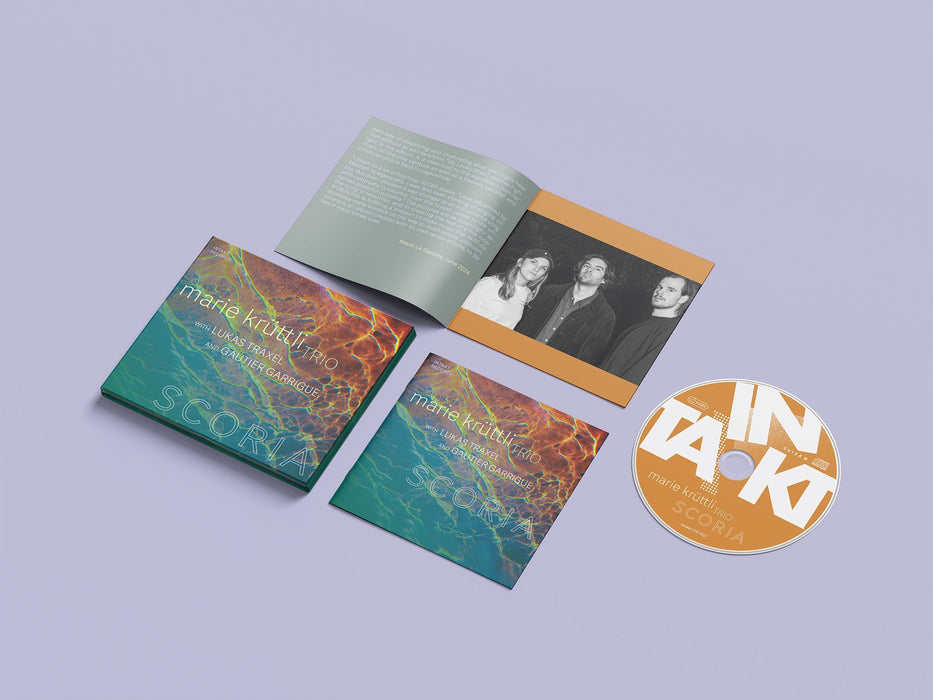
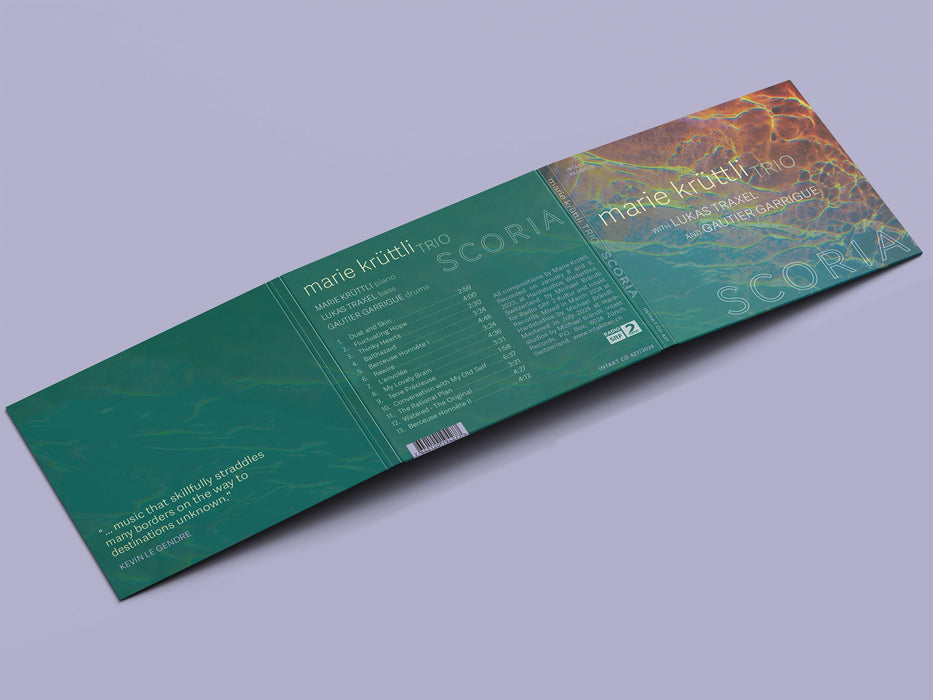
427: MARIE KRÜTTLI TRIO with LUKAS TRAXEL and GAUTIER GARRIGUE. Scoria
Intakt Recording #427 / 2024
Marie Krüttli: Piano
Lukas Traxel: Bass
Gautier Garrigue: Drums
Recorded on January 8 and 9, 2023, at Hardstudios, Winterthur, Switzerland, by Michael Brändli for Radio SRF 2 Kultur and Intakt Records.
More Info
Following the solo piano album Transparence, released on Intakt Records in 2023, Marie Krüttli, a jazz pianist from western Switzerland who is celebrated as “a young visionary and a premiere European jazz pianist whose touching, penetrating compositions make waves throughout the jazz community and beyond”, now presents the trio album Scoria together with bassist Lukas Traxel and drummer Gautier Garrigue. Together they draw on a broad vocabulary ranging from classical to jazz and contemporary music, in which the studio is an instrument and post-production an ally of performance. Fresh, bold and inspiring, the trio explores every possible aspect of playing together, sometimes with chamber music transparency, sometimes dense and impetuous, and always with captivating intensity. “And in creating the feel of a live loop Krüttli’s trio is fulfilling a mission to make music that skillfully straddles many borders on the way to destinations unknown. Scoria is an album created with its own sense of time, to be heard many times over“, writes Kevin Le Gendre in the liner notes.
Album Credits
Cover art and graphic design: Fiona Ryan
Liner notes: Kevin Le Gendre
Photo: Palma Fiacco
Produced by Marie Krüttli and Intakt Records
Published by Intakt Records
All compositions by Marie Krüttli. Recorded on January 8 and 9, 2023, at Hardstudios, Winterthur, Switzerland, by Michael Brändli for Radio SRF 2 Kultur and Intakt Records. Mixed in March 2024 at Hardstudios by Michael Brändli. Mastered in July 2024 at Hardstudios by Michael Brändli. Produced by Marie Krüttli and Intakt Records. Published by Intakt Records.
The “Que Jazz É Este?” festival has always shown a thoughtful commitment to presenting concerts tailored to more discerning audiences, often (though not exclusively) at Teatro Viriato. The young Swiss pianist Marie Krüttli returned to Portugal for the third time. After captivating listeners in Porto and Braga, it was Viseu’s turn to welcome this rising star of contemporary European jazz.
Her music dwells in a delicate space, suspended between serenity and tension. Krüttli shapes her compositions with an openness that invites the listener in, building from small, striking melodic and harmonic fragments — concise and refined — that serve as the music’s structural heart. Her writing is meticulous yet never rigid: it breathes, it listens, and it embraces improvisation. This openness is a hallmark of a certain stream within European jazz — one that distances itself from American rubato and familiar standards, favoring a more abstract path, unbound by tradition and rich in sonic texture.
Krüttli plays with remarkable grace — understated, yet intensely present. The double bass weaves its own melodic thread, not merely supporting the piano, but responding to it, expanding it. The drums do far more than keep time; they conjure an entire sonic landscape, rhythmic and textural, layered and alive. Together, the trio creates a compelling interplay where each instrument charts its own course, yet remains deeply connected to the others. The result is a sound architecture that’s intricate and alive — a thoroughly modern take on the classic jazz trio. One senses the unity of the group, but also the distinct voice of each musician, intertwining without ever overpowering one another. It’s music that demands attentive listening — and offers deep reward in return.
There are no dramatic emotional peaks; instead, the music burns with a quiet intensity. Restraint here does not mean absence — it means depth. Each piece unfolds in contrasting episodes, carefully crafted and connected with sensitivity. Krüttli performed compositions from her new album as well as some yet-to-be-recorded works. The transitions between pieces were so fluid, it was often hard to tell where one ended and the next began.
Her piano voice lies somewhere between the lyrical elegance of Paul Bley and the visceral density of Cecil Taylor, blended into a language that is uniquely her own. One moment in particular stood out — a duet between piano and drums, free, raw, and deeply musical — a moment of pure dialogue, where sound became conversation, and time seemed to suspend.
https://jazz.pt/reports/perguntar-nunca-e-demais
Les compositions de la jeune pianiste Marie Krüttli ne cherchent pas à plaire ou à charmer. Elles disent leur désir d’étrangeté avant toute chose. Elles ne sont pourtant pas d’accès difficile et s’entêtent à errer dans un monde où il fait bon s’éloigner du quotidien. Monsieur Paul Bley vient-il à passer par là (Fluctuating Hope) qu’il s’efface aussitôt, les complexes balais de Gautier Garrique segmentant une mélodie à rebrousse-poil (Thinky Hearts). C’est qu’ici l’équilibre est sans cesse mis à contribution. La liberté n’est pas un leurre mais un élément essentiel à la cohésion d’un trio parfaitement unifié (remarquable, précis et précieux Lukas Traxel).
Parfois contemplative, rarement emportée, adepte des justes dosages, Marie Krüttli nous propose avec ce deuxième CD pour Intakt un univers profond et parfaitement défini.
https://www.jazzin.fr/marie-kruttli-trio-scoria/
The trio consists of Marie Krüttli on piano, Lukas Traxel on bass and Gautier Garrigue on drums and percussion Following her solo piano album “Transparence”, released on Intakt Records in 2023, Marie Krüttli, a young jazz pianist from western Switzerland brings influences from classical to jazz and contemporary music to her music.
Rich piano notes and a sustained chord introduce opener ‘Dust and Skin’, which transposes from what could be a lullaby to something more menacing, as the music crescendos in an alluring piece that promises much for the rest of the album (which is certainly delivered). ‘Fluctuating Hope’ has more evident bass and mazy piano runs; the cymbal work is particularly notable. ‘Thinky Hearts’ is more upbeat and shorter (Most of the pieces are four minutes or less). On ‘Balthazard’, the pianist displays the full range of her dexterity, returning to a more basic form at its conclusion with some thoughtful stick work from Gautier, as much of a percussionist as a drummer, which suits the pianist’s pensive and searching approach. ‘Rewire’, with its rippling piano arpeggios and nimble bass work, is in more traditional post-bop jazz mode with a classical flair on top, increasing in intensity as it progresses. Similar things can be said about ‘L’envolée’, a walking, or more precisely, jogging bass line this time (I love the way the drummer fills the gaps, the rolling drums at the end in particular). ‘My Lovely Brain’ is an interesting title. An engaging bass riff starting it off, three repeated piano chords with variations, straightforward, dreamlike and charming. (I could imagine the initial riff being developed into something more demonstrative live). ‘Terre precieuse’ is only a couple of minutes long, a minimalist lament, the synergy between the musicians laid bare. I looked forward to ‘Conversations with Myself’ not just because of its title but, because, I was intrigued to hear how Marie and her compadres would make use of a musical space of uncharacteristic length, exceeding six minutes; this reveals a complexity of composition that is by no means impenetrable and demands further exploration. ‘The Rational Plan’ is a jaunty, insistent piece and by now I have come to appreciate the level of excellence album “Scoria” has attained, but there is more to come.
As I have already attuned to the distinctive, evocative style and ethos of the Marie Krüttli Trio there is little more to say, and instead, I will just listen as the album draws to its close. I am not disappointed as the warmth of the music flows over me in the beguiling second part of an earlier piece entitled ‘Berceuse Honnete’. You can almost hear the cradle rocking.
https://www.Dimensions in Sound and Space.com/post/marie-kr%C3%BCttli-trio-with-lukas-traxel-and-gautier-garrigue-scoria-intakt-records-2024
Nach ihrem Solo-Piano-Album Transparence, präsentiert die Westschweizer Jazzpianistin Marie Kruttli, nun das Trio-Album "Scoria", zusammen mit dem Bassisten Lukas Traxel und dem Schlagzeuger Gautier Garrigue. Frisch, kühn und inspirierend erkundet das Trio alle möglichen Aspekte des Zusammenspiels, meint unser Jazzkritiker Niklas Wandt.
https://www.ardaudiothek.de/episode/swr-kultur-am-samstagnachmittag/das-marie-kruttli-trio-mit-scoria/swr-kultur/13917833/
In the liner notes to her recent trio album Scoria (Intakt) the Berlin-based Swiss pianist Marie Krüttli asserts, “For a long time I wanted to be considered 100% as a pianist. Now I feel more free, I just want to create, express myself and dare.” I’m not exactly sure what that means, although Kevin Le Gendre, who wrote the essay, interprets the comment as a statement of the pianist’s growing engagement as a producer and her increased embrace of technology. I’m not familiar enough with the Krüttli’s career arc to weigh in on that matter, but I don’t hear either shift making a big mark on the new album—the first with new drummer Gautier Garrigue joining her and longtime bassist Lukas Traxel— apart from the closing piece “Berceuse Honnête II,” a more floaty, reverb-drenched ballad that’s heard earlier on the album in a much drier, more transparent iteration. But I do find the album to be much stronger and more affecting than anything she’s done previously. The group performs on Wednesday, November 20 at Panda Theater.
Krüttli has a fairly mainstream, vaguely European aesthetic, a lyric, introspective quality that yielded meandering and chilly results on Transparence, her 2023 solo album. She hasn’t abandoned that aesthetic on Scoria, but the way she interacts with Garrigue and Traxel feels more inspired and exploratory than on earlier trio recordings, particularly in terms of time. There’s an elastic quality to the inner workings, with the musicians sometimes coming together for precise arrangements marked by pin-point accuracy, only to slacken and allow greater space, fluctuation, and conflict. There are numerous pieces that convey a delicious tension through theway she plays over the groove. On “Thinky Hearts” she unleashes eloquent, frequently changing cadences and densities that align and separate from the figures shaped by her partners, but nothing is more captivating than “My Lovely Brain,” a tune influenced by Meshell Ndegeocello where the bassist and drummer simulate a kind of head-nodding loop that Krüttli deftly pushes against by articulating lengthy phrases that are a bit out of sync with that groove, almost like a mini-Steve Reich phasing gambit that never resolves itself. It’s my favorite thing on the album. While most of the recording is quite restrained, there are a few stormy excursions, such as the endlessly churning waves of crashing piano in “Rewire” or the spry, accelerating and decelerating machinations of “Balthazard,” which you can hear below. Sometimes I can sense a touch of the multivalent comportment of Paul Bley—at once deeply melodic and emotionally fraught—but more often I detect the direct emotionalism of Bill Evans, a quality driven home by the title of the piece “Conversations With My Old Self,” which doesn’t feature her playing in conversation with herself, old or present, but with her trio, in one of the more splintery, multipartite excursions here.
https://petermargasak.substack.com/p/blankets-of-sound
Seguito del solo "Transparence" (BU#300), pubblicato dalla sempre attenta etichetta di Zurigo l'anno scorso, qui la pianista svizzera è accompagnata da Lucas Traxel al contrabbasso e Gautier Guarrigue alla batteria. Numeri densi di swing non euclideo che va a parare dalle parti di Craig Taborn (Thinky Hearts, Rewire) o dei Punkt. Vrt. Plastik (Balthazard) o si fanno più sparsi e languidi alla maniera di Paul Bley (Berceuse Honnete I, l'envolee); eclettismo e maturità la portano poi a produrre tracce che vanno in tutt'altra direzione, come My Lovely Brain, che lei dichiara ispirato da Meshell Ndegeocello e suona come una deliziosa strumentale di hip-hop evoluto. Notevole la dichiarazione di Conversation with My Old Self, in perfetto equilibrio tra tripudio, groove e riflessione. In chiusura Berceuse Honnete II, che torna sui passi della prima versione e ne muta il paesaggio attraverso l'uso dello studio di registrazione come strumento, tra echi e rifrazioni. Un disco senza un filo di adipe, miele o retorica.
Vulkanische Wechselspiele
Marie Krüttli schafft mit vermeintlicher Leichtigkeit, woran sich andere Musikerinnen die Finger wund spielen. Die 33-jährige Pianistin aus dem Jura spielt komplexe Kompositionen, als seien es Kinderlieder. Klassisch geschult, hat Krüttli an den Jazzschulen von Lausanne und Luzern die Spielarten zeitgenössischer Musik erkundet und ihren eigenen Sound gefunden. Diesen entwickelt sie seit zehn Jahren mit eigenen Bands und auf eigenen Platten weiter. Oft dabei war der Zür-cher Kontrabassist Lukas Traxel, der mit dem französischen Drummer Gautier Garrigue auch ihr neues Trio bildet. Auf dem Album «Scoria>> zelebrieren die drei einen sanften Kammerjazz, der die Finessen ihres Zusammenspiels freilegt. Wie das gleichnamige Vulkangestein Scoria changieren die Stücke zwischen klaren Klangstrukturen und freien Passagen. Das Krüttli Trio geht mit dem neuen Album ab Oktober auf Tournee.
De retour au Fossé des Treize le festival Jazzdor nous a gratifié d’une soirée dont il a le secret en faisant se succéder sur scène deux formations inspirées et aventureuses faisant fructifier de manière très personnelle et hyper actuelle l’héritage protéiforme du post-free américain et européen des années 80/90.
C’est d’abord le nouveau trio de la pianiste suisse Marie Krüttli qui dès les premiers instants de sa prestation nous a embarqué dans un voyage à la fois onirique et ultra-sensoriel parfaitement envoûtant. Accompagnée du contrebassiste zurichois Lukas Traxel, hyperactif sur la jeune scène berlinoise, et du batteur français Gautier Garrigue, décidément sur tous les fronts du jazz contemporain — la pianiste nous a offert un aperçu saisissant de l’étendue de son talent en développant une conception à la fois très ouverte et structurée du trio à travers une musique toute en nuances de textures et variations d’intensité fondée sur un contrôle collectif constant des dynamiques orchestrales. Ce qui fascine dans cette musique c’est le paradoxe fécond entre un dispositif très précis façonnant et orientant le discours à travers des formes soigneusement agencées agissant comme des sortes de points de rendez-vous où reprendre pied collectivement et le caractère fondamentalement fluctuant, flottant et comme en éternelle dérive de la musique. Entrant dans un permanent et fascinant trilogue avec la contrebasse à la fois digressive et subtilement pulsative de Traxel et la batterie gestuelle, coloriste et chorégraphique de Garrigue, le piano introspectif de Krüttli, tout en esquive, esquisse et effets de miroitements démultipliés ouvre sur un univers intérieur d’une richesse infinie faisant dialoguer de manière subliminale l’art du trio de Paul Bley ou Marylin Crispell avec les harmonies précieuses du piano français du début du 20e siècle et les formes hallucinatoires de la musique répétitive. La confirmation d’une grande musicienne.
Vint ensuite le nouveau projet du saxophoniste alto Michaël Attias, l’une des figures à la fois les plus secrètes et inventives de la riche scène new-yorkaise avant-gardiste. Jetant des ponts depuis toujours entre l’Europe et l’Amérique, Attias a constitué ce nouveau quartet en agrégeant autour de son saxophone lyrique et acidulé, la féérie sonore du vibraphone de la Berlinoise d’origine grecque Evi Filippou, les grooves élastiques du contrebassiste canadien Miles Perkin et la sophistication polyrythmique de la batterie du Belge Samuel Ber. S’engageant dans un long set d’un seul tenant en une sorte de suite mouvante enchaînant des compositions aux formes labyrinthique et savamment enchâssées comme une sorte de plan séquence kaléidoscopique, le quartet invente une musique à la fois cérébrale et organique, pleines de chausse-trappes rythmiques et sophistications harmoniques, mais toujours animée par un sens du groove et une sorte de lyrisme abstrait renvoyant directement au jazz et son histoire. Propulsé par la paire rythmique Ber/Perkin, remarquable tout du long de précision et d’inventivité, et constamment stimulé par l’extraordinaire chatoiement de pulsations et de couleurs harmoniques offert par le vibraphone d’Evi Filippou, la grande révélation pour moi de ce concert, Michaël Attias, au cœur du dispositif, oriente avec beaucoup de spontanéité et de réactivité les mouvements et les humeurs collectives de la formation tout en demeurant d’une fidélité scrupuleuse aux formes et structures servant de cadres à l’improvisation. Une musique érudite et constamment stimulante qui s’adresse autant à l’intelligence qu’à l’ivresse des corps.
https://www.jazzmagazine.com/les-news/jazz-live/jazzdor-39-marie-kruttli-trio-michael-attias-quartet/
Sist gang jeg hørte om pianisten Marie Krüttli, var på solo-pianoalbumet Transparence, som kom ut på Intakt Records tidlig i 2023, og som ble anmeldt i positive ordelag på salt peanuts* i mars i fjor, I følge den britiske jazzjournalisten Kevin La Gendre, blir hun regnet som en jazzpianist fra det vestlige Sveits som er «en ung visjonær og en ledende europeisk jazzpianist hvis rørende, gjennomtrengende komposisjoner skaper bølger i hele jazzmiljøet og utover», som han skriver i coverteksten på det nye trioalbumet Scoria. Her møter vi henne sammen med bassisten Lukas Traxel og trommeslageren Gautier Garrigue.
De har klart å presse inn 13 komposisjoner av Krüttli på CDen, som er innspilt i Hardtudios i Winterthur i Sveits den 8. og 9. januar i fjor. Altså omtrent samtidig med at hun utga sin soloplate.
Og det hele starter med Krüttlis melankolske pianospill, før de andre to kommer inn, hvor de melder sin ankomst med fynd og klem, og som får pianisten til å bevege seg inn i det frie, nesten samtidsmusikalske landskapet. Dette er en relativt kort komposisjon/improvisasjon, hvor de tre gir oss en «frisk» melding om hva som kommer.
Men i andresporet, «Fluctuating Hope», beveger de seg inn i et landskap som jeg føler er en forlengelse av Paul Bleys første trioplater på 1960-tallet. Dette er en låt som mange ville sagt var Bley, hvis de ble konfrontert med komposisjonen i en «blindfold»-test. Selv lyden høres 60-talls ut. Og både bassist Traxel og trommeslager Garrigue går rett inn i tradisjonen.
Jeg innrømmer glatt at noen av pianistene fra 1960-tellet står høyt i kurs hos meg, særlig Bley og Bill Evans (i det litt melankolske landskapet), så her treffer trioen meg midt i hjertet. Men låten er ikke så lang, og den mer sprelske «Thinky Hearts», tar oss med inn i et litt annet landskap. Men fremdeles føler jeg at 1960-tallet er en favoritt hos Krüttli og medmusikerne. Men i stedet for å kopiere stilen helt, tar de musikken med seg inn i nåtiden, og serverer den som ferskvare.
Og slik fortsetter de. Tre musikere som vil ta tradisjonen fra de gamle mestere med inn i vår tid, og modernisere den, men hele tiden ha minst tre bein i tradisjonen.
At Krüttli er en spennende og kreativ pianist, fikk vi flere bevis på på hennes soloutgivelse. Og i trioform synes jeg hun tar oss med videre inn i sin utmerkede, fargerike og spennende, musikalske verden, som er et godt sted å være.
De 13 låtene er varierte, men hele tiden med 1960-talls-tradisjonen tatt med inn i nåtiden på en fremragende måte. Og om Krüttli fremstår som en glimrende pianist med mange gode ideer og utmerket teknikk, har hun med to musikere som takler hennes musikk og ideer på aller beste måte. Traxel er en strålende bassist som går fint inn i Krüttli sine ideer med kunnskap og «store ører», og trommespillet til Garrigue er akkurat passe «løst» til å fungere perfekt inn i trioen. Og på noen spor slipper de seg skikkelig løs, og vi får en tornado av heftig pianotriomusikk som får veggene til å svette i skrivestuen.
«Scoria er et album skapt med sin egen følelse av tid, som skal høres mange ganger», skriver Kevin Le Gendre i coverteksten. Og sjelden har jeg vært mer enig med den gode engelskmannen. Dette er nydelig jazzmusikk, som gjennomgående er tidløs, men med klare røtter hos de beste jazzpianistene fra 1960-tallet, og tilført ferske ingredienser som også gjør utgivelsen til en ytterst aktuell plate.
https://salt-peanuts.eu/record/marie-kruttli-trio-2/
Annoyed by the relative softness of a band opening for Drug Church at recordBar last week, I hiked several blocks to catch a bit of Kansas City’s premier Bill Evans acolyte at Voo Lounge. The swing associated with pianist Michael Pagán is the pinnacle of American elegance. The Berlin based Swiss pianist Marie Krüttli is also capable of playing pretty. Joined by bassist Lukas Traxel and drummer Gautier Garrigue, Krüttli balances beauty with coarseness on the new album Scoria. Not beholden to American jazz tradition, Krüttli’s trio possesses a rhythmic and sonic freedom capable of shocking listeners in North America. Not free but altogether liberated, Scoria’s thorniest improvisations are no less ferocious than the repertoire of Drug Church.
https://www.therestandstheglass.com/reviews-and-commentary/scoria
